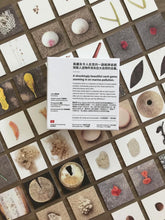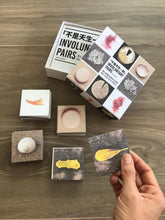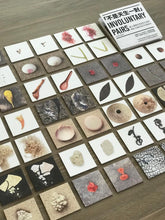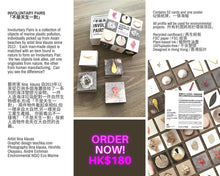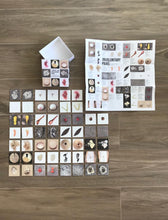Involuntary Pairs by liina klauss x Eco-Marine: Card Game on Marine Pollution
Regular price
$180.00
Sale
Involuntary Pairs
Man-made lost in Nature
「不是天生一對」
當人造物件丟失於大自然
liina klauss
100% profits goes to environmental projects in Hong Kong
1. Free pick up in store starting Dec 16, 2020
2. Local shipping via SF express paid by receiver
3. International shipping available via our gift concierge WhatsApp 97393162
A shockingly beautiful card-game zooming in on marine pollution.
美麗及令人反思的一副紙牌遊戲「不是天生一對」探索人造物件丟失在大自然的含義。
A card-game zooming in on plastic pollution in the oceans, making the magnitude of the crisis visible. A dynamic way to see, understand and grasp the fate and implications of our plastic age!
細看海洋塑膠污染的一副紙牌遊戲,「不是天生一對」讓隱藏的塑膠危機展現在眼前。 通過遊戲我們能了解和正視塑膠危機的深遠影響,探索人造物件丟失在大自然的含義。
Involuntary Pairs is a collection of objects of marine plastic pollution, individually picked up from Asian beaches by artist liina klauss since 2013 . Each man-made object is matched with an item found in nature to form an Involuntary Pair: the two objects look alike, yet one originates from nature, the other from human manufacturing. Can you see the difference?
藝術家 liina klauss 自2013年以來從亞洲多個海灘撿拾了一系列的海洋塑膠污染物。 一件人造海洋垃圾配對一件自然生物標本,形成「不是天生一對」: 兩件物件看起來相似,但一樣來自大自然,另一樣來自工業生產線。 你能看出不一樣嗎?「不是天生一對」探索人造物件丟失在大自然的含義。
Contains 52 cards and one poster
52張紙牌,一張海報
Recycled cardboard / 再生紙板
FSC paper / FSC 紙張
Plant-based Ink / 植物性油墨
100% plastic-free / 不含塑膠
Designed in Hong Kong
香港設計
When you go to the beach, what do you find? Sea-shells, some algae, maybe a crab and lots of plastic: a bottle-cap, a candy-wrapper, even an old shoe. These items belong in human hands, not in the ocean! Plastics have invaded the natural environment to such an extent that it is hard to separate the natural from the manufactured.
Every year, 8 million metric tons of plastic enter the oceans. Of these 60% originate from South-East Asia. The Involuntary Pairs you see in this game are items found on beaches in Hong Kong, Indonesia, Taiwan and Malaysia.
Though unseen from the surface, the implications of marine plastic are profound: Fish, seabirds, turtles, and marine mammals mistakenly eat plastic, since plastic can look like fish eggs, crabs, jellyfish, algae and other items found in nature, leading to poisoning, starvation and death. Additionally animals can become entangled in plastic causing suffocation and drowning. This problem ultimately affects us all, as plastic waste contaminates the food we eat and the water we drink. We are living in the age of a plastic crisis.
Governments, scientists, and corporations are now taking action to reverse the plastic crisis. There are improvements in waste collection practices, an upscaling of recycling capacities, and legislating outright bans on certain uses for plastic. Start-ups are collaborating with scientists to invent plastic alternatives as well as researching ways to break down plastics faster. Corporations are innovating through good design, and reducing materials at source. How can you be part of this movement? You can take action by refusing single-use plastics like straws, take-away food containers, and plastic bags; support green shops and businesses; join beach clean-ups, and tell your friends and families about the plastic crisis!
Eco Marine envisions a society where nature and modern urban life thrive. Our mission is to inspire greater appreciation and guardianship of nature and to catalyse action for integrating this mindset into all aspects of contemporary urban life. We are delighted to collaborate with artist liina klauss on the Involuntary Pairs game to introduce a new way to understand the marine plastic crisis.
liina klauss is a German artist & activist who explores visual and conceptual perceptions of waste. Her works translate environmental pollution into over-flowing installations of screaming colours and horrifying abundance. liina creates anything from large-scale land-art to delicate mosaics. In this game she plays with perspectives between the individual and the collective, distance and tangibility, beauty and shock and between perceptions of significance and trivia.
每次到海灘時,你會找到什麼東西?貝殼、海草、螃蟹? 還是瓶蓋、糖紙、舊鞋及其他塑膠物件?這些人造物件不應該在海洋裡或海邊找到,卻塑膠已入侵了大自然;人造的及自然的已難以分開。
每年8百萬公噸塑膠垃圾進入海洋,其中6成源自於東南亞國家。這遊戲中的「不是天生一對」來自於香港,印尼,台灣及馬來西亞的海灘。
海洋塑膠污染在水面不容易看見,但這問題卻影響深遠。塑膠外貌百變,可以相似魚子、螃蟹、水母、海藻及其他大自然物種,魚類、海鳥、海龜和海洋哺乳類動物往往會錯誤地進食塑膠,導致中毒,飢餓,以及死亡。動物也可被塑膠纏繞,引起窒息和淹死。世界上已沒有人能逃離海洋塑膠污染,因為海洋塑膠已經污染了人類的食物和食水。我們都活在塑膠危機的時代。
政府、科學家及企業都展開了扭轉塑膠危機的行動。多個國家都在提升垃圾收集系統,加大回收能力,及立法管制或禁止某些塑膠用途。初創公司和科學家在合力研發能替代塑膠的物料以及研究加快塑膠降解的方法。企業也通過創新設計在源頭減廢。你願意一起參加扭轉塑膠危機的行動嗎?你可以杜絕一次性塑膠,例如飲管、外賣盒、膠袋等,也可以支持綠色商舖和企業,加入海灘拾垃圾活動,並傳播塑膠危機的信息給身邊的親朋好友。
Eco Marine 深信大自然和現代城市生活能和諧共存。我們的使命是培育城市人對大自然的欣賞和守護,推動環保及保育行動,並將其帶到現代社會的各個環節。我們很高興能與藝術家 liina klaus 合作製成「不是天生一對」遊戲,讓大家可以用一種新的方式了解海洋塑膠危機。
liina klauss 是一位德國藝術家和環保推動者,她的作品從視角及概念的層面剖析廢物的含義。她的專長是將環境污染物轉化成色彩銳利和令人思維震驚的藝術作品。liina 的創作模式廣泛,包括大地藝術裝置及精美的馬賽克畫作。在這遊戲中,她探索多種對立的概念:個人與集體、遠距離與可觸摸、美麗與震驚、重要與瑣碎。
Artist 藝術家 liina klauss
Graphic design 平面設計 teschka.com
Photography 攝影 liina klauss, Hirohito Okayasu, André Eichman
Environmental NGO 環保組織 Eco Marine
Involuntary Pairs by liina klauss x Eco-Marine: Card Game on Marine Pollution






